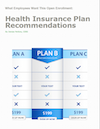It’s On. Financial Services Firms Won’t Give Up Their Control Over Retirement Plans Without A Fight.
It is fair to say that before federal and state lawmakers started focusing on individual access to health insurance and retirement plans, the private sector was okay with maintaining the status quo. A system where if you worked for a large employer and were continuously employed, you could receive subsidized health insurance and have access to a convenient workplace retirement plan. And, the higher your income the more you benefitted from the tax-favored design of these plans.
Then along came the Affordable Care Act (aka Obamacare), bringing the lack of access to affordable health insurance for tens of millions to the top of the public policy agenda. Sensing an inevitable shift in the status quo, private sector health insurance companies and big pharmaceutical companies mobilized to protect their interest. Change to the status quo was fine with them as long as the status quo did not change. Additions to the status quo that left the existing system intact are okay. They lobbied hard to get everything they wanted and little or none of what they did not, and they succeeded.
Soon after, the federal and many state and local governments turned their focus to individual access to retirement savings plans. They found similar problems as with access to health insurance. The lower an individual’s income, the less hours they worked, and the smaller the company they worked for, the less likely they were to have access to a workplace retirement plan. To address the issue, lawmakers proposed their own plans. Some wanted to allow workers without workplace retirement plan access to federal or state retirement plans. But most elected to design new plans that had some but not all of the features of 401(k) style defined contribution plans. Now who would have a problem with this approach? The current system showed little or no interest in these workers. Surely, the financial services sector would not object to everyone having access to a workplace retirement plan. Well, some of them kinda do object.
We Don’t Need No New Plans
Large financial institutions were not completely supportive of the idea of adding “new” retirement plans. They felt like they already had products to meet everyone’s needs even if they did not market these products to the individuals policymakers were trying to help. When President Obama announced the creation of the MyRA (My Retirement Account), many financial service providers scoffed. They called and small potatoes and redundant.
Some suggested that the states might be able to do a better job at addressing the retirement plan access problem. Continue Reading...
It's Time For Retirement Plan Sponsors To Take Control Or Not

Most Americans think that people who work in the retirement and investment services industry are extremely smart and component. And many of these workers are smart and competent, but not all of them. Every industry and profession has its not so smart and not so competent bunch. However, somehow just like doctors and lawyers, retirement and investment services workers enjoy an automatic elevated status in comparison to other professionals. Now there is nothing wrong with showing respect for a person's knowledge and skill level and the effort it took to obtain it, but should this come automatically?
No, it should not and here's why. When you place a person or profession in an elevated position, you are unlikely to question what they do, why, and how it will impact you. But even worse is that the person in that position is not likely to feel any obligation to share the information with you in the first place. See, they already know you are in awe of them and their credentials. They also know they intimidate other people. So much so that you'll pretty much agree to do whatever they suggest.
Don't agree? Then explain to me why most employers did not know what retirement plan fees they paid or that they paid them at all. Or explain to me why some employers don't know that they are the plan sponsor and fiduciary of their retirement plan and are ultimately responsible for their plan's compliance. Or better yet, explain to me how the retirement and investment services industry got so big so fast by offering routine services with very little risk to their bottom line.
Still not persuaded? Check out the minutes of any workplace retirement plan committee to see what if any questions they are asking their retirement plan representatives. And if the retirement plan reps participate in these meetings, you can bet that there is a lot of nodding in agreement going on. I know. I participated in these meetings and they go a lot like this: Continue Reading...
Testing Workplace Retirement Plans For Equality and Fairness

A major criticism trending in the employee benefit arena is that tax-advantage retirement plans (mostly the 401(k))-style ones) benefit higher paid workers. Progressive politicians and academics continue to propose changes to these plans. Individuals defending the current tax structure of workplace employee benefits rebuke these proposals by pointing out their technical inaccuracies. They claim that the tax features of these plans are equal and fair because they are subject to annual non-discrimination (ND) testing. This battle is not going away benefit pros, and if you conduct your own non-discrimination testing, you are right in the middle of it.
What is Non-discrimination (ND) Testing?
As you can imagine, non-discrimination testing is a complicated process that actually consists of multiple tests. However, basically, its purpose is to determine if highly paid and key employees benefit more from the plan than lower paid employees. It can be difficult to understand what these tests mean unless you perform or assist in performing them yourself. But that is not my main concern here. If non-discrimination testing is what proponents of 401(k)-style retirement plans want to use to claim they are equal and fair, let’s talk about why this may not be true for one simple reason. And what is that reason…? Well, the data used to perform the tests comes from the employer and its accuracy is questionable.
Data Troubles
I want to meet the employer willing to testify under oath that the data they gather to conduct non-discrimination testing for any of their qualified employee benefit plans is 100% accurate. I say this because I know from experience that gathering this data is not a simple process. In fact, it’s often difficult. Why? Well, it usually requires the assistance of others from the Payroll and Information Technology departments. Which means providing these folks with an understandable explanation of data needs and timetables. Continue Reading...
Workplace Retirement Plans – Exposing Fees, Finally

I have a confession to make. After years and years of discussing retirement plan features with new and old employees, I never once spoke of plan fees. Not during new hire benefits orientations, one-on-one information sessions, or group training sessions. I never even had a conversation about retirement plan fees with an employee benefit colleague, my supervisor, or the Chief Financial Officer (CFO). I did once have a conversation over dinner about plan fees with a third party administrator trying to get our company's business.
I'm making this confession because it wasn't until a few years ago that I realized the poor service I was providing in this area to employees. I considered fees in my own portfolio but I never once in my career thought of incorporating fee information into my discussions with employees. But all of that changed when the U.S. Department of Labor (DOL) passed regulation 408(b)(2) mandating annual fee disclosure notices for employees participating in workplace 401(k)-style retirement plans. And now retirement plan fees are all I want to talk about. For me, it is the biggest game-changer in workplace retirement plan administration and education.
What is Fee Disclosure?
DOL Regulation 408(b)(2) amends the Employee Retirement Income Security Act (ERISA) of 1974. It requires covered service providers (e.g., third party administrators and their subcontractors) to retirement plans to reveal information about their compensation. The goal is to help plan sponsors (e.g., employers) determine if the compensation is reasonable and identify potential conflicts of interest. The regulation went into effect on July 2012. Continue Reading...
Workplace Retirement Plans-Benefit Professionals Must Question The Status Quo

The U.S. federal government administers two of the largest retirement plans in the country, Social Security (SS) and the Thrift Savings Plan (TSP). Social Security is available to all eligible workers and the TSP is available to federal workers and those in the uniformed services. Social Security is similar to a non-government defined benefit pension plan. Eligibility is based on years worked and wages earned, and benefits last a lifetime. The TSP plan is similar to 401(k)-style retirement plans where the employee contributes part of their pay to the plan and chooses a fund or funds to contribute to, and benefits are not guaranteed.
Given the federal government’s experience with large, complex retirement plans and the significant benefits they provide, benefit professionals may want to listen when the government suggests changes in this area. And it is not just the federal government proposing changes to workplace retirement plans, at least ten states are looking to expand access to a retirement savings account to workers without one. Unfortunately, these proposals rarely receive support or endorsement by benefit professionals.
This is odd. Benefit professionals are dedicated to helping employees minimize financial risk through insurance and savings accounts. So why are they not in support of efforts to expand access to these products?
Reasons Benefit Professionals Do Not Support Changes to Workplace Retirement Plans
Continue Reading...


 Denise Perkins
Denise Perkins




